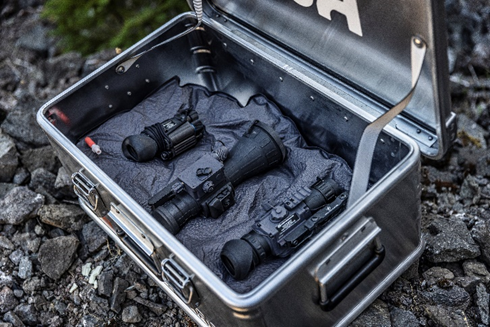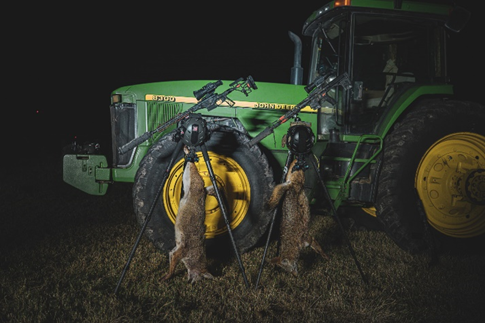7 Helpful Tips for Maximizing Your Field Performance with Night Rifle Scope
Jun 21st 2024
The excitement of hunting goes beyond daylight hours. But navigating in the dark demands specialized equipment and a well-developed tool kit.
One of the most commonly used tools for exploring the nocturnal world is a night rifle scope. Mastering this device can open up the world to you and enhance your field performance.
If you’re a night owl, or you’re looking for a tactical advantage, you’ve come to the right place.
Here, we'll talk about tips for maximizing your field performance with a night rifle scope.
1.Invest in Quality Equipment
If you really want to get the most out of night time hunting. You should consider purchasing the best you can afford. As the saying goes, buy once cry once. This is very true for night vision equipment like a night rifle scope, you should invest in a premium quality device. Look for brands that are known for their high-quality optics and long-lasting construction.
You may be tempted to go for a cheaper option but remember that quality comes at a price. A quality night rifle scope provides you with clear images and superior performance. It also ensures longevity, so you can use it for years to come.

2.Acquaint Yourself with Each Parameter of Your Scope
Once you have your new night rifle scope, make sure to read the user manual carefully. Get familiar with each component and practice setting it up in different lighting conditions. Environmental conditions affect the performance of the night scope; especially, ambient light conditions.
Learn how to calibrate your scope, adjusting the focus to different simulated ranges, and switching between them. This allows you to make accurate adjustments quickly and accurately in the field.

3.Understand the Process of Adjusting Your Scope Reticle for Zeroing
Night rifle scope zeroing is one of the most important things you can do to ensure the accuracy and precision of your shots. The first step is to zero your night rifle scope during normal daylight hours at a target distance you are comfortable shooting. Do this at a local shooting range. Don’t go overboard and try shooting to extreme distances, as you will not be able to do the same while shooting at night. When shooting at night you must consider additional safety precautions like back stop and the lack of depth perception compared to shooting during day light conditions. Most night hunters do not shoot past 300 yards. New hunting grounds can prove more difficult as you will not know ranges to various landmarks, providing you with range estimates to your target. Make sure to use the provided front lens cap, as it works as a day light filter. Preventing you from damaging your Night Vision Scope when zeroing at the range.
After you set a target zero, adjust your night rifle scope settings in low light conditions to compensate for differences in visibility.
Be sure to compensate for things like bullet drop and windage. You can also consider other factors, such as the type of ammunition and the environment you will be shooting in.
4.Simplify the Configuration of Your Equipment for Maximum Performance
If you want to get the most out of your night rifle scope, it's not enough to just attach it to your rifle. Make sure that your scope is mounted correctly and aligned with your rifle.
Use quality mounts and rails to attach your scope to your firearm so you don't have to worry about it moving or being misaligned.
You can also add accessories like a recoil pad or cheek rest. This can make your night rifle scope more comfortable and stable for extended use.

5.Leverage Accessories To Improve Functionalities
Consider investing in additional accessories to improve your field performance. Additional equipment like infrared illuminators, laser rangefinders, and thermal imaging devices can give you valuable supplemental information and function in low-light conditions. Try different combinations of equipment until you find the setup that works best for you and your needs. For some it is worthwhile to invest in a stable and modular tripod for a more stable standing position when shooting.
6.Make the Right Selection of Reticle
Choosing the correct night vision rifle scope reticle can have a huge impact on your field performance. Traditional crosshair reticules are fine for daytime use, but they can be difficult to identify in low light.
Select night vision reticles, such as an illuminated duplex or mil-dot reticle. These reticules provide better visibility at night.
Experiment with switching to different reticle styles to see which one works best for you and your shooting style.
7.Have Adequate Training and Practice in Shooting Techniques
Make sure you're practicing proper shooting fundamentals like breath control, trigger squeeze, and follow-through, so you're as accurate and consistent as possible.
You should also practice shooting positions that are suitable for night-time operations, such as crouching, kneeling, or supported positions using a tripod or shooting sticks to help with stability.
Practicing in simulated night conditions on a regular basis will help you develop muscle memory and build confidence in your skills.

Conclusion:
It takes a combination of experience, knowledge, and skill to master the night rifle scope. Follow the above-mentioned helpful tips and techniques to enhance your performance in the field and increase your success in your night hunting activities. Don't forget to invest in top-of-the-line equipment if you want a true companion for your fieldwork. With hard work and patience, you can unlock your full night rifle scope potential and become a better night-hunter or tactical operator.
